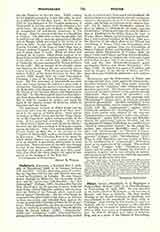

Pfefferkorn, JOHANNES, a baptized Jew, b. probably at Nuremberg, 1469; d. at Cologne, between 1521 and 1524. In 1505, after many years of wandering, he, together with his wife and children, was converted to Christianity at Cologne. He soon became known through his efforts for the conversion of the Jews and his controversy with Reuchlin. In “Der Judenspiegel” (Cologne, 1507), he demanded that the Jews should give up the practice of usury, work for their living, attend Christian sermons, and do away with the Books of the Talmud, which caused such hatred against Christianity. On the other hand, he condemned the persecution of the Jews as an obstacle to their conversion, and defended them against the charge of murdering Christian children for ritual purposes. Bitterly opposed by the Jews on account of this work, he virulently attacked them in: “Wie die blinden Juden ihr Ostern halten” (1508); “Judenbeicht” (1508); and “Judenfeind” (1509). Convinced that the principal source of the obduracy of the Jews lay in their books, he tried to have them seized and destroyed. He obtained from several Dominican convents recommendations to Kunigunde, the sister of the Emperor Maximilian, and through her influence to the emperor himself. On August 19, 1509, Maximilian ordered the Jews to deliver to Pfefferkorn all books opposing Christianity. Pfefferkorn began the work of confiscation at Frankfort-on-the-Main; thence he went to Worms, Mainz, Bingen, Lorch, Lahnstein, and Deutz. But a new imperial mandate of November 10, 1509, gave the direction of the whole affair to the Elector and Archbishop of Mainz, Uriel von Gemmingen, with orders to secure opinions from the Universities of Mainz, Cologne, Erfurt, and Heidelberg, from the inquisitor Jakob Hochstraten of Cologne, from the priest Victor von Carben, and from Johann Reuchlin. Pfefferkorn, in order to vindicate his action and to gain still further the good will of the emperor, wrote “In Lob and Eer dem allerdurchleuchtigsten grossmechtigsten Fürsten and Herrn Maximilian” (Cologne, 1510). In April he was again at Frankfort, and with the delegate of the Elector of Mainz and Professor Hermann Ortlieb, he undertook a new confiscation.
Hochstraten and the Universities of Mainz and Cologne decided (October, 1510) against the Jewish books. Reuchlin declared that only those books obviously offensive (as the “Nizachon” and “Toldoth Jeschu”) should be destroyed. The elector sent all the answers received at the end of October to the emperor through Pfefferkorn. Thus informed of Reuchlin’s vote Pfefferkorn was greatly excited, and answered with “Handspiegel” (Mainz, 1511), in which he attacked Reuchlin unmercifully. Reuchlin complained to the Emperor Maximilian, and he answered Pfefferkorn’s attack with his “Augenspiegel”, against which Pfefferkorn published his “Brandspiegel”. In June, 1513, both parties were silenced by the emperor. Pfefferkorn however published in 1514 a new polemic, “Sturmglock”, against both the Jews and Reuchlin. During the controversy between Reuchlin and the theologians of Cologne, Pfefferkorn was assailed in the “Epistoli obscurorum virorum” by the young Humanists who espoused Reuchlin’s cause. He replied with “Beschirmung”, or “Defensio J. Pepericorni contra famosas et crlmin ales obscurorum vi regum epistolas” (Cologne, 1516), “Streitbiichlein” (1517). When in 1520 Reuchlin’s case was decided in Rome by the condemnation of “Augenspiegel”, Pfefferkorn wrote as an expression of his triumph “Ein mitleidliche Klag” (Cologne, 1521). Pfefferkorn was a fanatic and his public and literary life had little of sympathy or grace, but he was certainly an honorable character and the caricature which his opponents have drawn of him is far from true.
FRIEDRICH LAUCHERT

